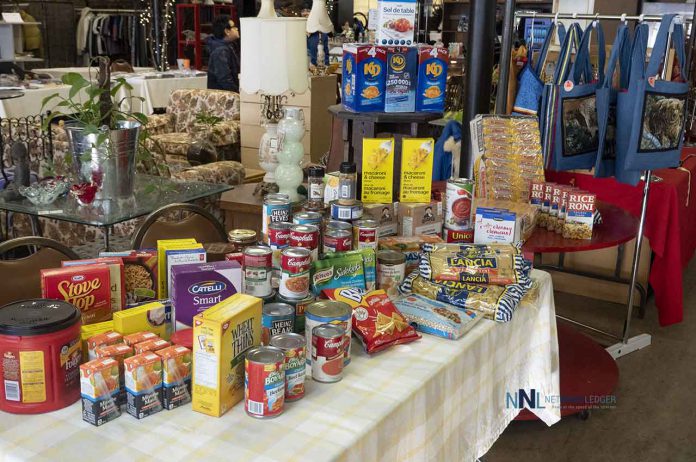THUNDER BAY – The COVID-19 crisis has affected us all in our homes, communities and places of work – but the impact has been different for each of us. The directive for physical isolation and staying inside can be a welcome opportunity to slow down and spend quality time with loved ones, but for many, it has brought immense economic, social and emotional challenges.
As a network that is focused on the health and well-being of all people involved in our regional food system, the Thunder Bay and Area Food Strategy (TBAFS) is committed to addressing immediate food-related needs along with the underlying concerns about food security, food supply and long-term sustainability.
We are also committed to supporting Indigenous peoples’ access to their land and waterways to access food and medicines, and the autonomy to protect their communities. A swift, reflective and respectful response to the current crisis will help to ensure we can identify and fill existing gaps while contributing to a more equitable and sustainable food system for all.
The COVID-19 crisis has exposed the lack of resilience in our local food system because of our dependence on imports from outside our community. The “just-enough, just-in-time” food system and long supply chains dominated by large corporations are fragile at the best of times.
The COVID-19 global pandemic may lead to additional supply shortages, higher food prices, and a widening gap between those with economic means and those living in poverty. People that are most vulnerable are experiencing more significant impacts. For example, low-wage workers are losing their jobs, people’s time and energy are being stretched to take care of children and other dependents, public spaces that offer critical warm places are limiting access, while food banks, meal programs and other city services are closing or reducing availability.
The emotional strain is causing additional pressures. Personal safety for those in abusive relationships and in precarious circumstances is severely undermined. While many of us yearn for a “return to normality”, for too many in our community, normal was already at a crisis point.
Never has the importance of an equitable and resilient food system been so apparent. During this unprecedented and difficult moment, many individuals and groups from the public, private, nonprofit and charitable sectors have stepped up to the challenge.
We recognize governments at all levels that have implemented economic response plans that include financial support for individuals and families, those facing unemployment, students and seniors, businesses, and Indigenous peoples. We also commend the healthcare professionals and frontline workers that are taking great risk to ensure the health of the broader population.
However, the well documented structural changes that are needed in the current food system and in our society seem even more difficult to attain now. The core purpose of the TBAFS remains to continue to provide a solid vision and framework for the creation of an equitable food system, especially in the face of the COVID-19 pandemic.
The TBAFS has been tracking and supporting the work of our members to address both short-term and long-term solutions. Our collaborative work will be especially critical when we need to rebuild lost social and financial infrastructure post-pandemic. We need to continue to work together, now more than ever, in a spirit of collaboration and respect. It is vital that we consider those most impacted by the COVID-19 pandemic, and support the most vulnerable. We call on all sectors across the food system in the Thunder Bay area to support our communities’ immediate needs in ways that ensure our food systems are more equitable and sustainable today, and into the future.
We call on social service providers to:
- Ensure all users of emergency food services are treated with respect and dignity (for example, that recipients do not face degrading reporting requirements);
- Work in solidarity with other partners to ensure cross-sectoral coordination of services and responses, especially in a time when services are limited;
- Continue providing much-needed emergency food services, while advocating for longer-term equity and justice (e.g., poverty alleviation, publicly funded social services, a more resilient food system); and,
- Operate according to health and safety guidelines, as outlined by the Thunder Bay District Health Unit, to protect employees, volunteers, service users, and the community.
We call on Businesses to:
- Provide support, compassion, and accommodations when workers are sick or taking care of family members;
- Ensure relevant government supports provided are redistributed among workers;
- Support products from local food producers, harvesters and processors, as much as possible; and,
- Operate according to health and safety guidelines, as outlined by the Thunder Bay District Health Unit to protect employees and the community.
We call on Municipal Governments to:
- Advocate for regional food system solutions as critical services – e.g. urban agriculture, farmers markets, etc.;
- Support innovative local food distribution platforms and systems;
- Consider how all new emergency measures and policies impact food systems; and,
- Continue to fund social services and community work to ensure a strong social safety net.
Written and Signed by the Executive Committee of the Thunder Bay and Area Food Strategy
Karen Kerk, Coordinator, Thunder Bay and Area Food Strategy
Erin Beagle, Roots to Harvest
Jeff Burke, Brule Creek Farms
Sue Hamel, EcoSuperior
Charles Levkoe, Canada Research Chair, Sustainable Food Systems, Lakehead University
Jessica McLaughlin, Indigenous Food Circle
Ryan Moore, Community Economic Development Commission
Dan Munshaw, City of Thunder Bay
Kristen Oliver, Councillor, City of Thunder Bay
Gwen O’Reilly, Northwestern Ontario Women’s Centre
Brandon Postuma, Councilor, Oliver Paipoonge
Silva Sawula, Thunder Bay District Health Unit







